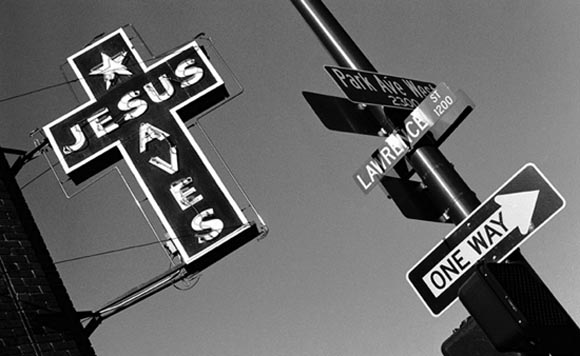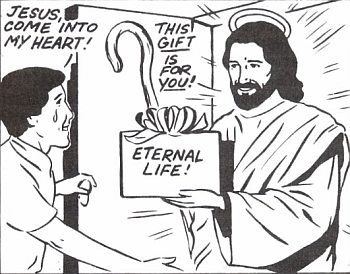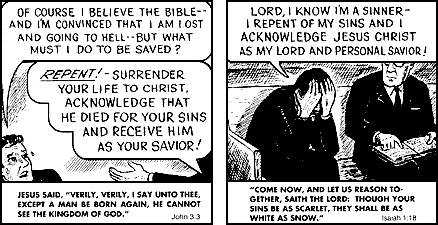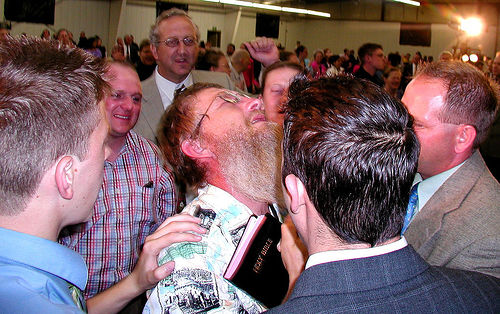
I have been trying to sort out in my own brain some thoughts about the brands of Christianity that are based on “conversion” theology.

I’m doing this in order to understand my own background better.

When I was a boy, I learned about the need for all people to be “saved” or “converted.” This usually meant some sort of deep experience in which a person undergoes a radical change. My father told the story of his conversion. He was hunting alone and sat down to think. Something happened to him at that point. When he rejoined the other hunters he told them he had been “saved” or in the lingo “accepted Jesus Christ as his Lord and Personal Savior!”

I’m reading a book on this topic (The Evengelical Conversion Narrative: Spiritual Autobiography in Early Modern England by D. Bruce Hindmarsh).
When I was in my teens I can remember looking around on a Sunday Morning at West Court Street Church of God in Flint Michigan where my Dad was the minister and wondering what exactly were we doing and how did it start?

Now in my sixties I’m still wondering but beginning to have a bit of a clue. Hindmarsh’s book is helping me. He presents an astute picture of evolving understandings of alternative Christian churches that spring up in Great Britain mostly in the 18th century.

The sources of what I think of as fundamentalist churches, self-described as evangelical are complex and surprising. I think that the oscillating situation of which flavor of Christianity was the state religion of Great Britain prepared the way for some of this. It had the interesting effect of driving non-Catholics out of the country and into Europe where they ingested ideas about their religion that ended up influencing subsequent thinking.
Also, the gradual evolution of all technologies at the time had a tremendous effect. Travel became more easy in 18th century. So the influential thinkers, John Wesley and George Whitefield, spent a great deal of time riding around England and crossing the Atlantic spreading their ideas. They also wrote letters which now were sped more quickly to diverse situations.

The communities (the gathered churches as Hindmarsh refers to these churches – non-Roman Catholics and non-Anglicans of all brands) would often read these letters in their services. People were telling each other the stories of their “conversions” mostly from situations of what they saw as empty ritual to a new and emotional commitment to Christianity.

Another interesting thing to me is that many of these thinkers felt that what was happening was a sign of imminent return of Christ and the end of time.

This was in the mid 18th century. When I was a kid, I can remember weird “end time” religious pamphlets in my maternal Grandmother’s house.

Again an association between “being saved” (conversion) and prophecies fulfilled.
I’m not being too specific here because I know that this is kind of a boring topic.
I am finding answers to how the basic meanings differ. American Evangelical and Fundamentalist Christians basic ideas are very different the meaning of liturgical worship in Roman Catholic, Lutheran and Anglican circles.
It begins to occur to me that “conversion” Christian thinking is an entirely different religion than Liturgical/ritual (or whatever you want to call it) Christian thinking. The former seems to have sprung up in a wave of societal change in the 18th century.
As Stress Drives Off Drone Operators, Air Force Must Cut Flights – The New York
Remote pilots suffer the same rate of Post Traumatic Syndrome that pilots in actual missions do.
Offering Services, ISIS Digs In Deeper in Seized Territories – The New York Times
People have no choice but the organization that offers the most hope, however little that is.
As Vladimir Putin Talks More Missiles and Might, Cost Tells Another Story – NYT
As usual the bluster is different from the reality, but I’m still keeping an eye on this stuff.
Senate Votes to Turn Presidential Ban on Torture Into Law – NYT
I couldn’t figure out if this has to be ratified by the House or not.
A Thirsty Colorado Is Battling Over Who Owns Raindrops – The New York Times
Against the law to gather rain water in a rain barrel. Weird.
The Other Terror Threat – The New York Times
The other threat is right wing extremists who have done more damage than any terrorist of any other ilk. I told Eileen I hesitated to put this link up on Facebooger. She said why not? I said so many of my friends and family are right wingers and get their news from organizations that are more about polemic than informing.
I put it up yesterday.